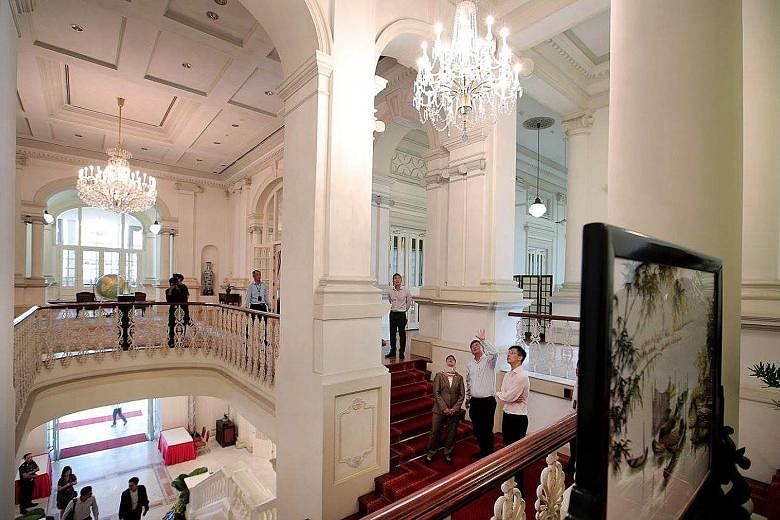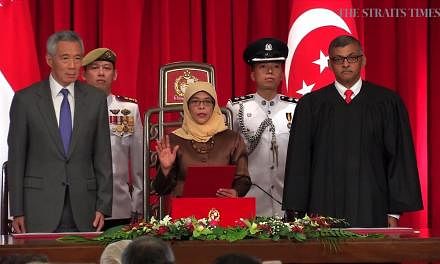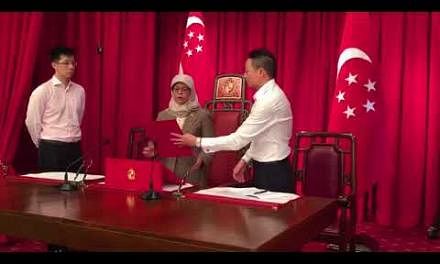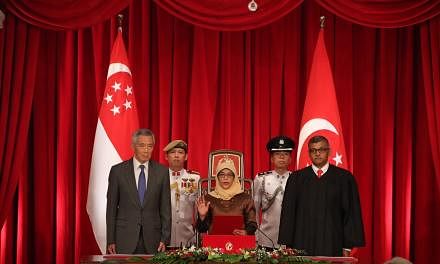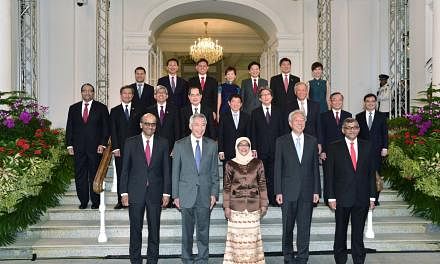The presidential election in 2011 is remembered as Singapore's most hotly contested. Four candidates stood in a race that went down to the wire, with Dr Tony Tan Keng Yam finally winning by 0.35 per cent of the votes.
In contrast, the election this year saw Madam Halimah Yacob elected unopposed last week - the third no-contest since elections began in 1993. Before, the president was appointed by Parliament.
Yet, this year's presidential election might go down as among the most hotly discussed.
In the lead-up to it, major changes were introduced to the way the elected presidency works, which resulted in, among other things, the election being reserved for candidates from the Malay community as it has not been represented in the office since 1970.
These changes, as well as the eventual walkover, triggered considerable debate online and in physical forums. In her swearing-in speech last Thursday, President Halimah, 63, acknowledged that some Singaporeans did not agree with the Government on the need to reserve elections.
She sought to be a unifying figure, saying: "I respect their views."
Minister in the Prime Minister's Office Chan Chun Sing, too, had earlier this month noted in a forum the unhappiness in some quarters. He said the Government had been prepared to "pay a political price" in the short term when it introduced the changes, because it strongly believed in their long-term benefits.
As President Halimah embarks on her six-year term, some of this debate offers a springboard for learning more about the elected presidency.
The reserved election was a focal point of much debate. What issues did the debate highlight about Singapore's multiracial fabric?
Another discussion trigger was the walkover. Why was there one, and what might walkovers mean for the elected presidency in the long run?
And, was there enough lead time from the mooting of the changes to the eventual election for Singaporeans to digest the changes?
Insight speaks to political observers on what, as a result, has emerged about the elected presidency as an institution.
UPDATING THE PRESIDENCY
Some 20 months before the election, the Government began a process that resulted in major changes to how the elected presidency would work - the most significant since the elected presidency began in 1991.
Among them were:
First, a system of reserving elections for an ethnic community if five terms have passed without a president from that community. As a result, the Government said the election this year would be reserved for the Malay community.
Second, raising the eligibility threshold for private-sector candidates to have headed companies with an average shareholder equity of $500 million in the three most recent years of reporting. Before, the threshold was $100 million in paid-up capital.
A court challenge was mounted by Dr Tan Cheng Bock, the runner-up in the 2011 election, on whether the reserved election should kick in this year or in 2023.
But his suit was eventually dismissed by the Court of Appeal. The reserved election for the Malay community went ahead this year.
-
KEY DATES AHEAD OF PRESIDENTIAL ELECTION 2017
JANUARY 2016
President's Address at the opening of Parliament flags the need to refresh the elected presidency
FEBRUARY 2016
Constitutional Commission appointed to study updating eligibility criteria for presidential candidates, review the powers of the Council of Presidential Advisers, and ensure minority candidates have a chance to be elected from time to time
FEBRUARY TO JULY 2016
Constitutional Commission meets, holds public hearings and deliberates
AUGUST 2016
Constitutional Commission submits its report to the Government, which accepts its main recommendations in principle
SEPTEMBER 2016
Government publishes its response to the report in a White Paper on changes to the elected presidency
OCTOBER 2016
Constitutional amendments tabled in Parliament
NOVEMBER 2016
Constitutional amendments are debated over three days in Parliament and passed
JUNE 2017
Mr Salleh Marican and Mr Farid Khan declare intention to stand for election
JULY 2017
Court dismisses Dr Tan Cheng Bock's first challenge on how reserved elections are counted
AUG 7, 2017
Madam Halimah Yacob announces decision to stand as candidate
AUG 24, 2017
Court dismisses Dr Tan Cheng Bock's appeal
AUG 28, 2017
Writ of Election issued
SEPT 11, 2017
Madam Halimah declared the only qualified applicant
SEPT 13, 2017
Madam Halimah elected President on Nomination Day
SEPT 14, 2017
Madam Halimah is sworn in as Singapore's eighth President
DEBATES OVER RESERVED ELECTION
Even as the courts deliberated over the timing of the reserved election, the bigger debate among Singaporeans was over substantive issues relating to reserving elections.
Emeritus Senior Minister Goh Chok Tong, for example, acknowledged some of this ground sentiment when he observed that reserving elections was "quite unpopular with a large proportion of the population".
Singaporeans with concerns about the reserved election asked if it was needed to achieve multiracial representation and if the principle of meritocracy was being loosened.
When members of the Malay community began declaring their intention to stand, questions about how a person's race is determined surfaced in some quarters.
Other than Madam Halimah, two prospective candidates who declared their intention to stand as candidates were marine services company chairman Farid Khan, 61, and listed property firm chief executive Salleh Marican, 67.
All three prospective candidates obtained certificates confirming that they belonged to the Malay community.
What impact did these debates about race and reserved elections have on multiracial Singapore?
Home Affairs and Law Minister K. Shanmugam said at a forum organised by the Institute of Policy Studies (IPS) earlier this month that debates on the reserved election were constructive. "The fact that we were able to talk about it, debate it... in a way it helps strengthen the overall multiracial fabric," he said.
Chua Chu Kang GRC MP Zaqy Mohamad tells Insight: "It was a learning journey for many Singaporeans. We became more aware of the range of views on multiracialism, and we learnt to respect the diversity of opinion."
He adds: "It was healthy for us to talk about issues which we otherwise would not have touched on in ordinary conversations."
IPS deputy director Gillian Koh adds that the strengthening of the nation's multiracial fabric could become clearer as President Halimah's term progresses. The "symbolic value of having a Malay-Muslim as president" could, over time, enhance inter-racial appreciation among Singaporeans, she says.
Some observers, however, were sceptical about the benefits of having such debates about race.
Former PAP MP Inderjit Singh says: "While I cannot say we weakened the social fabric of Singapore's multiracial society, I do feel we reopened the debate and highlighted our differences and the attitudes of the different races towards each other."
The debate over the definition of "Malayness" was also singled out as being particularly problematic.
Former Nominated MP Calvin Cheng says "the misunderstanding of what Malayness is, and the accusations that the definitions have been fudged, will be detrimental".
Dr Felix Tan of SIM Global Education adds the debate over racial definition "opened up a can of worms".
Racial definitions for the purpose of elections have been around since 1988, with the introduction of Group Representation Constituencies (GRCs). From this year, the same definitions that have been used in general elections are being applied to presidential elections.
Asked why Singaporeans had questions about these longstanding definitions, Dr Tan notes that presidential candidates have a much higher profile than minority candidates in GRCs, which could be why people started paying attention to the racial definitions only this year.
THE WALKOVER: WHAT ISSUES ARISE?
In contrast to the chatter over reserved elections, which persisted at moderate levels over the months leading up to the election, discussions over the fact that it would be a walkover erupted in a very short space of time.
There was genuine public uncertainty over whether there would be a contest, since three prospective candidates expressed a desire to stand. The walkover was finally confirmed last Monday, with the announcement that only one candidate - Madam Halimah - had the necessary certificates to run.
Mr Farid and Mr Salleh met the ethnic requirements - they were certified as Malay - but failed to meet the financial threshold for private-sector candidates.
Madam Halimah automatically qualified under the Constitution as she had held the key public office of Speaker of Parliament since 2013.
Two days after she was declared the only one eligible to run, she was formally elected on Wednesday, which was Nomination Day, and sworn in a day later, on Thursday.
There was considerable disappointment on social media with the walkover, with a group starting the hashtag #notmypresident. This was countered by another online group with the hashtag #halimahismypresident.
Observers had different explanations for why more qualified Malay candidates did not come forward to ensure a contest in Singapore's first reserved election.
Many observers felt the Government's tacit endorsement of Madam Halimah strongly discouraged others who might have been considering their candidacies. Observers who take this view include Professor Eugene Tan of the Singapore Management University (SMU), Mr Singh and Professor Tan Ern Ser of the National University of Singapore (NUS).
When Madam Halimah resigned from the PAP to prepare for her presidential bid, Prime Minister Lee Hsien Loong wrote in a letter: "I am confident that if elected you will do your best, as you have always done, and will bring dignity and personal warmth, experience of government and concern for the people, to the highest office in the land."
SMU's Prof Tan says that such endorsements cause hopefuls, particularly those from the public sector, to "abandon any plans to step forward and step up" - because of how difficult it is to defeat an establishment-backed candidate.
Mr Singh adds that some who qualify may be "concerned if the establishment will be unhappy" if they were to run against its candidate. "The sense of fear was a factor," he notes.
Another possible reason for the dearth of qualified candidates in this election was the higher threshold for private-sector candidates.
The Government had accepted the Constitutional Commission's recommendation that the threshold for private-sector companies whose heads would qualify as candidates be increased from $100 million in paid-up capital to $500 million in shareholders' equity.
The commission said there was a need to raise the threshold because, first, inflation had significantly increased the number of companies meeting the old threshold, and, second, because Singapore's reserves had grown by a lot since 1993 - which raises questions about whether heads of $100 million firms still had the requisite experience to oversee the reserves.
The commission recommended a $500 million threshold, arguing that it did not shrink the pool of candidates who qualify, vis-a-vis 1993. The $100 million threshold in 1993 saw 158 companies, or 0.2 per cent of companies in Singapore, qualify. The $500 million threshold last year would have seen the heads of an estimated 691 companies, or 0.23 per cent of companies in Singapore, qualify.
But some observers asked if this was a key factor leading to the walkover.
"The criterion is set too high for those from the private sector. Based on the previous criterion used, Mr Salleh Marican and Mr Farid Khan would have qualified," says Mr Yee Jenn Jong, a former Non-Constituency MP from the Workers' Party.
"We need to seriously question why we are measuring the presidency by such big money, which deprives us of more potential candidates to choose from," he adds.
IPS' Dr Koh agrees that the threshold may have been a factor, but does not agree that the threshold should, therefore, be lowered. "We must give it time - for good people to work towards qualification," she says.
With the latest walkover, Singapore has now seen three out of five presidential elections since 1993 ending in no contest.
Popular elections were introduced to ensure that presidents - whose role is to safeguard the nation's reserves and the integrity of the public service - had sufficient moral authority and mandate to oppose an elected Cabinet, if necessary.
Does the walkover have an impact on President Halimah's perceived mandate? Is there a danger that repeated walkovers would gradually weaken the institution of the presidency?
Former NMP Cheng says: "I would proffer that the whole raison d'etre of the elected presidency is in danger, if there is repeatedly no contest."
Without going through a contest, he adds, "we have no idea of the level of support he or she has and it thus saps the presidency of the source of its authority".
"In that case, we might as well go back to appointing presidents."
Professor Walter Woon of the National University of Singapore adds: "A contested election would have been the only way to still the critics and appease the cynics. If Puan Halimah had won with a clear majority, her mandate would be beyond doubt. As it is, there will always be accusations that the whole process was a farce engineered to parachute her into the job."
Prof Eugene Tan says walkovers might "diminish the institution and compromise its mandate, authority, legitimacy and potential".
Dr Lam Peng Er of the East Asian Institute adds that too many walkovers would "make a mockery" of the institution. He adds: "If you keep getting walkovers, it becomes a contradiction in terms - an elected presidency without an election."
But Dr Norshahril Saat of the ISEAS -Yusof Ishak Institute notes that founding prime minister Lee Kuan Yew was often elected in walkovers, and that this did not cast his legitimacy as MP or prime minister in doubt. Mr Lee's Tanjong Pagar constituency was uncontested in 1984 and in another five general elections from 1991 to 2011.
Nonetheless, Dr Norshahril concedes that presidents elected in walkovers may have to work harder over the presidential term to win the hearts and minds of the people.
Other observers say they do not believe the presidency is likely to see repeated walkovers in the future.
Mr Zaqy of Chua Chu Kang GRC notes that walkovers also used to be quite common in general elections, but have decreased over time as politics entered a more mature phase. He expects a similar trajectory for presidential elections.
Similarly, IPS' Dr Koh says: "It is likely that if the role is meaningful, it seems fulfilling and that sense of duty and public service is alive, we will not see a reduction in contestation, but a rise moving forward."
LONGER LEAD TIME?
After the 2015 General Election, Parliament opened in January last year. The President's Address stated that the political system, including the presidency, "must be refreshed from time to time, as our circumstances change".
This was the first strong sign that changes were in the offing.
This address was quickly followed by the setting up of a Constitutional Commission in February last year. The commission was asked to study options in line with terms of reference provided by the Government, and to then recommend amendments to the elected presidency.
The commission's report was published in August last year. Parliament debated and passed amendments to the Constitution last November, paving the way for the presidential election earlier this month.
A total of 20 months had passed from the time the Government announced its intention to make changes to the elected presidency.
Would a longer lead time have helped Singaporeans digest the changes better? Would stretching out the discussion have reduced the overall level of concern?
Some observers believe so.
SIM's Dr Tan says Singaporeans should preferably have been given three years "to understand, grapple with and accept the changes".
Mr Singh agrees more time would have been ideal. "If we were indeed addressing long-term issues on the multiracial nature of our society, then there was no rush to do it for this election," he says.
He adds that applying the changes to the 2023 presidential election would have provided this additional time.
Prof Eugene Tan agrees the discussion was hasty, noting: "Singaporeans need time to digest the changes and to be persuaded not just rationally but also affectively. There was the feeling that the changes were patronising and being forced down the throats of Singaporeans."
He adds: "Even if people have basically made up their minds about the slew of changes, the speed with which the Government proceeded with the changes resulted in an element of doubt in people's minds as to whether there was more to it than meets the eye."
But there are also a number of observers who feel that a longer lead time would not have made any difference.
Mr Zaqy believes that it would be hard to conclude if the Government could have aligned everyone on the issues - even if the lead time had been extended, say, to 60 months.
Dr Koh agrees: "If people were tuning in, it was a lot of notice. If they were not, and only do so when there is an opportunity to criticise the Government, then time is a non-issue.
"If people just don't tune in at all because they are consumed by daily life, which is perfectly understandable, or because they are apathetic, then, again, length of notice would not have made a difference. For this final group, only a contest and the need to vote would have caused them to tune in."
This idea that a contest is what many people were really looking for is also proffered by Prof Tan Ern Ser of NUS and Dr Lam.
Says Prof Tan: "I don't think more lead time would matter very much, if at all. What matters for those who are unhappy with the new rules is that PE2017 has not shaped up to be yet another occasion to challenge - directly or indirectly - the ruling party."
Dr Lam adds: "If we had given the Singapore public another six months, and there was no contest, I think they would feel just as frustrated."
FUTURE OF THE PRESIDENCY
The election is over, and the country settles down under a new president.
Some debates from this election will linger, others may fade away.
For example, the issue of the reserved election, while contentious, may not recur for a while, since the earliest date of the next possible reserved election would be 2041 - or five terms after President SR Nathan left office in 2011, assuming no president gets elected from the Indian or other communities category.
Indeed, the most ideal situation is for Singapore to never need another reserved election - which would happen if minorities are routinely elected in open elections.
President Halimah has a six-year term ahead of her to engage Singaporeans as their head of state. How she plays her role will no doubt also have a bearing on how Singaporeans perceive the institution and the issues discussed in this election.
As Emeritus Senior Minister Goh Chok Tong said in congratulating her, the process of this election has been "highly controversial", but Madam Halimah herself is "not a controversial figure".
"The focus so far has been on the process, but we should not let whatever unhappiness weigh down her duties," he said.
"We expect our head of state to be a unifying figure but we must also do our part to help the president succeed. Congratulations, President Halimah Yacob."

